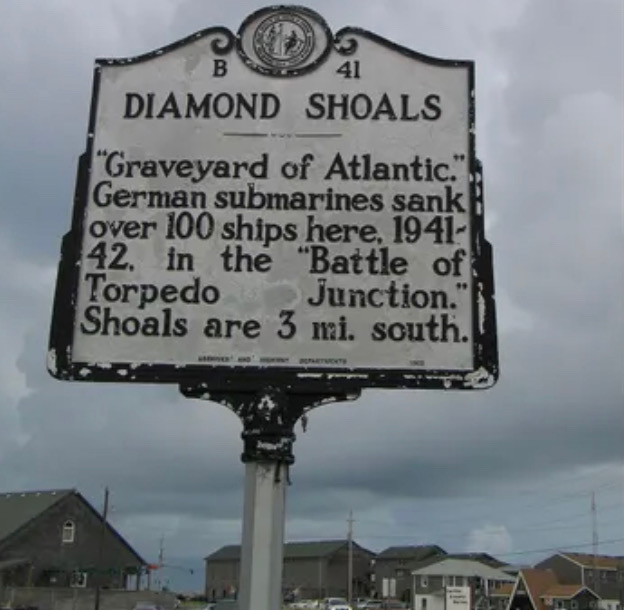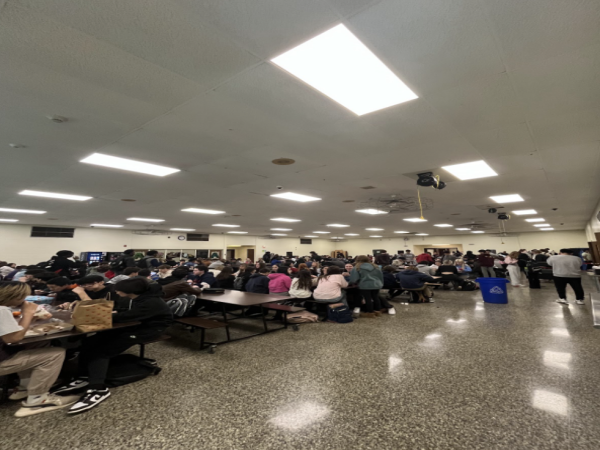Small Island, Big History: the Unknown Submarine Battles of Ocracoke, North Carolina
Aside from the infamous bombing and attack on Pearl Harbor in 1941, many Americans remain unaware that United States land suffered from attacks on multiple other occasions throughout the second World War. Because the war was mainly fought thousands of miles from American territory, most Americans learn about battles such as Normandy and Iwo Jima, rather than the naval fights that occurred near the shores of Ocracoke Island, a strip of land belonging to North Carolina’s coastal region, the Outer Banks. In fact, today, unbeknownst to the majority of Americans, Ocracoke Island claims the title of “Graveyard of the Atlantic”, boasting that hundreds of ships sunk just miles away from its coastline.
According to the North Carolina Department of Cultural Resources, in Diamond Shoals, Ocracoke Island, between 1941 and 1942, over 100 German ships sunk in the Battle of Torpedo Junction. However, during this time, 397 United States merchant vessels also sunk, due to the efforts of the German naval attacks. The Germans, looking to “take advantage of poor American war preparations and strike at… merchant-rich sea lanes,” according to the United States National Park Service, opened Operation Paukenschlag (English translation: Operation Drumroll). German U-boat submarines were utilized by Hitler’s naval force, the Kriegsmarine, to launch torpedoes at the ships. The Kriegsmarine continued to strike, without retaliation, causing “Germans themselves [to be] astonished at their [own] ease of dominance,” noted the National Park Service. Many front-line commanders begged Admiral Ernest J. King, Commander in Chief of the US Fleet, to respond to the German attacks, but to no avail. Where was the United States, defending its North Carolina citizens?

The United States military practically turned a blind eye to its citizens, by sluggishly responding to the rapidly amounting German threats in Torpedo Junction. Destroyers, the ships needed to eliminate these U-boats, and patrol planes were elsewhere. Other planes and boats were unused and kept at dock, even when they could have been used to neutralize the Germans relentless attacks on the island. England, aware of the issues in Torpedo Junction, even offered to help the United States solve the issue, yet it would be long before Admiral King’s avail. Thus, as American casualties continued to rise, Army Chief of Staff George Marshall wrote to Admiral King, alerting him that “the losses by submarines off our Atlantic seaboard and in the Caribbean now threaten… [the] entire war effort.” Army Chief Marshall also added that the losses in Torpedo Junction could possibly “cripple… [American] means of transport…[and cause the American military to] be unable to bring sufficient men and planes to bear against the enemy.” Without retaliation from the United States or its allied forces, Ocracoke citizens found the second world war close to their homes.
Dr. Joseph Schwarzer, II, director of North Carolina’s Maritime Museum System, said that from within the island, you could “hear this dull roar… [and your] room would light up and you [could] go out and see that a ship had been destroyed.” Furthermore, according to the BBC, Ocracoke islanders often heard loud noises and encountered ship debris during this time period. On their way to school, students would come across such debris, writes BBC reporter Brian Carlton. Losing these boats to the Germans also hurt the American economy, considering the expensive loads they carried. Dr. Schwarzer explained to the BBC that “an average ship leaving the US carried enough supplies to feed England for more than a day.”
Finally, the United States military yielded to England’s offer of help. President Franklin Roosevelt would reach out to Prime Minister Winston Churchill and request naval assistance. Consequently, both American and English forces would obliterate the German forces attacking the merchant ships, resulting in the Ocracoke islanders living safely again and finally pushing the war entirely away from United States land. Yet, during the process of beating the German submarines, the bodies of four dead English soldiers washed up to shore. These English soldiers were buried within the United States, on Ocracoke Island. Interestingly enough, the land where these soldiers were buried is permanently leased to Britain, meaning that a foreign country has sovereign territory within the United States. In the cemetery, there is a plaque bearing the quote of British World War One soldier Rupert Brooke: “If I should die, think only this of me/ That there’s some corner of a foreign field/ That is forever England.”
Ocracoke Island is no longer a site of bloodshed and there are no longer any U-boats trawling the waters. Instead, Ocracoke is a wonderful place, and is continuously ranked one of America’s best beaches, by Stephen Parker Leatherman, also known as Dr. Beach, an American geoscientist, coastal ecologist, and author. One can come today to Ocracoke to enjoy the beaches, watersports, ice cream, shops, and look for pirate treasure (the famous pirate Blackbeard supposedly hid his treasure within the beaches of Ocracoke). Most importantly, however, one can commemorate the brave soldiers of World War II without ever having left the borders of the United States. It is important to not only remember the big battles of history, but the minor ones too.

Asher Boiskin is a senior and one of Eastside’s Online Editors-in-Chief. He loves participating in Model United Nations conferences, reading nonfiction,...








